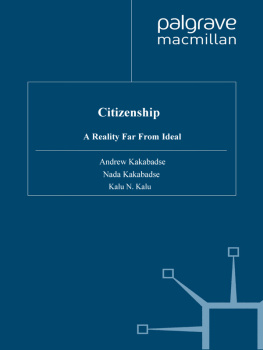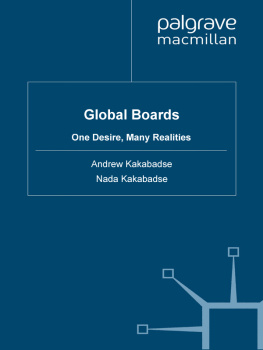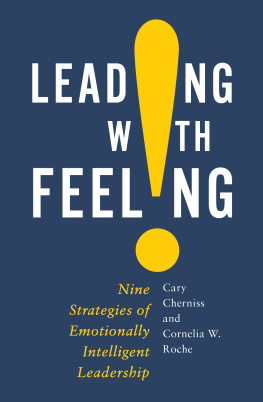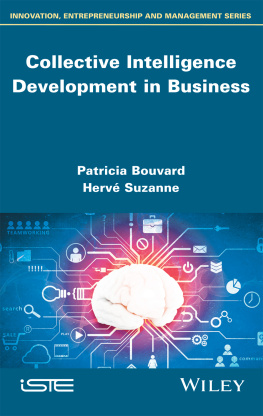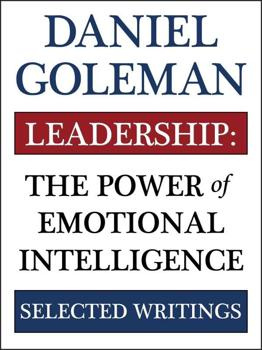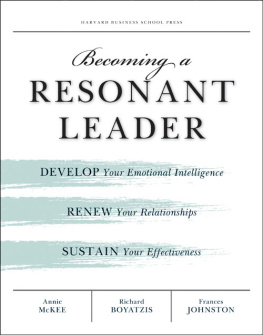LEADERSHIP INTELLIGENCE
LEADERSHIP INTELLIGENCE
The 5Qs for Thriving as a Leader
ALI QASSIM JAWAD AND ANDREW KAKABADSE

CONTENTS
IQ is a leaders ability to acquire knowledge, reflecting their deductive/rationalist abilities and drawing together contrasting strands of information to emerge with a compelling argument that entices.
EQ is a leaders ability to understand and manage both their own emotions, and those of others.
PQ is a leaders ability to navigate a way forward through diverse stakeholders agendas while ensuring continued engagement with critical players.
RQ reflects the capacity of a leader to emotionally sustain high performance under continued pressure and adversity.
MQ is a leaders ability to understand their own value system and draw on this to determine the moral boundaries of individuals, teams and of the organization.
Special Thank you
We are deeply grateful to all the ministers of state, CEOs, chairmen, general managers, middle- and lower-level managers, public servants, politicians and the managers and employees of third-sector organisations, for their inspiration, views and comments on leadership that have led to this book. Working with you, coaching and counselling you, consulting with you and researching you has provided the thinking and evidence that has made the 5Qs concept a reality. All of you are special as each of you has provided a unique insight, which we have drawn upon to shape this book.
Special mention is due to His Majesty Sultan Qaboos bin Said, Head of State, Sultan of Oman. Oman is a geographically vast country with a small population, fairly modest natural resources and complicated neighbours. Despite this, Oman is politically unassuming and has managed to become a byword for stability, tolerance and sensible neutrality. How did Oman pull it off? The answer is leadership, and we hope this book captures how.
The fact that Sultan Qaboos bin Said is still revered by the population after nearly half a century in power is remarkable.
A high IQ has clearly been needed. Running a company is demanding; running a country even more so. Running a country with a complex cultural make-up is even harder. Running it successfully for nearly half a century is an astounding achievement, one that requires a leader with a high degree of cognitive intelligence to be able to devise, maintain and adapt his arguments in the face of new and evolving challenges.
But IQ is not enough. Sultan Qabooss understanding of himself and of his very diverse citizens led him to realize that what others saw as a challenge was actually an opportunity to build a stronger nation. A keen sense of others concerns, insecurities and aspirations, coupled with a good understanding of ones own emotions and with having a good grip on them, emotional intelligence (EQ), complements IQ, inspiring a way forward.
Political intelligence (PQ) is also important. The sultanates careful navigation of the contrasting agendas of its fellow members of the Gulf Corporation Council (GCC) and other regional and global powers, such as Iran, the United States, China, India and the United Kingdom has required a highly attuned political instinct and steadfast determination to engage the different stakeholders. Charting a way forward through diverse stakeholders agendas while ensuring continued engagement with critical players, has been a distinct feature of his reign.
His resilience (RQ) has also been evident. Sultan Qaboos did not lose sight of his goals despite facing economic pressures such as a drop in the price of exports, or political pressure when the geopolitical fault lines yawn wide enough to trigger a severe diplomatic rift.
A further interesting fact suggests there is more at work. In 2015 the International Centre for the Study of Radicalisation and Political Violence at Londons Kings College found that not a single Omani had joined the more than 20,000 foreign fighters battling alongside Islamic State of Iraq and Syria (ISIS). In November 2016, the Sydney-based Institute for Economics and Peace released its annual Global Terrorism Index, which assesses the impact of terrorism on 163 countries on a scale of zero to ten. Just 34 countries scored zero, and Oman was the only country in the Middle East among them.
This is not the result of chance. It is the result of moral leadership (MQ). It is the presence of an unwavering moral compass has allowed Sultan Qaboos to have a clear vision from the very beginning of his reign of what he wanted his country to be. He started by empowering women at the same time as overcoming an inherited insurgency and uniting the sometimes fractious tribes behind his vision. Clarity about where his moral compass points and his staying true to it have made Oman into a peaceful nation with a cohesive society and a strong sense of nationhood.
The concept of the 5Qs outlined in this book, and its underlying ideas, form the basis of the Omani National Programme on Competitiveness and Citizen Wellbeing, bringing together government and the private sector in partnership to realize ambitious national goals. This by itself is a welcome acclaim.
So thank you again. Wed like to dedicate this book to the men and women who have provided living examples of what well-rounded leadership can be. What we as authors have learnt from you is that these principles are universal. They can be applied to the running of companies, to governments, to multilateral institutions. Distilling and codifying the principles of the 5Qs is the purpose of this book. We hope it will contribute to your own success by providing a framework for your continued development.
Dr Ali Qassim Jawad
I wish to thank my loving and supportive wife, Yasmin, and my six wonderful children, Eman, Zahra, Mona, Adam, Amal and Ibrahim, for their continuous love and inspiration.
I also wish to thank H. E. Sayed Khalid bin Hilal Al-Busaidi, Minister of the Diwan of Royal Court, for his guidance, support and encouragement throughout this project.
Prof Andrew Kakabadse
I wish to thank my wife, Professor Nada Kakabadse, for all her help, love, support and continual advice on this book. Thank you also to Sophia and Reeves. Having watched you as the next generation on how you face up to and address the challenges confronting you, it is clear that the concept of the 5Qs spans geography and generations. Without knowing it, your input to my thinking has been invaluable.
It is better to lead from behind and to put others in front, especially when you celebrate victory, when nice things occur. You take the front line when there is danger. Then people will appreciate your leadership... There are times when a leader must move out ahead of the fl ock, go off in a new direction, confident that he is leading his people the right way.
NELSON MANDELA
Leadership was something I (Peter Hain) learnt on the job.
Nobody taught me how to be an anti-apartheid campaign leader as I found myself thrust into doing when I was aged nineteen. Still less two decades later was I tutored to be a member of parliament and subsequently a government and then cabinet minister.
Yet the experience gained in this unique journey from protestor to peer during fift y years in politics has enabled me to teach MBA students and apply the lessons Ive learnt to businesses and other organizations.
It has been both a privilege and a great responsibility entrusted to me to lead others to achieve success, perhaps the most important one being negotiating the 2007 settlement to the Northern Ireland confl ict, which brought bitter old enemies into self-government together.


